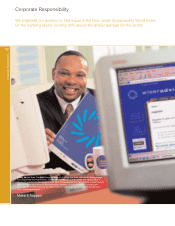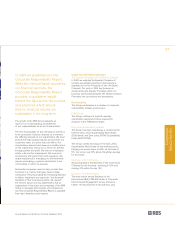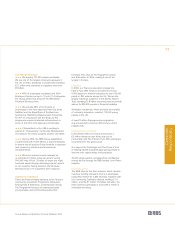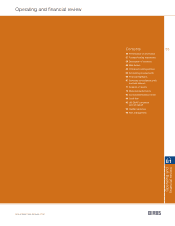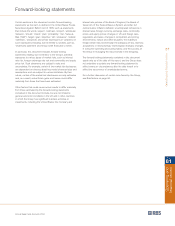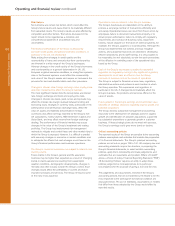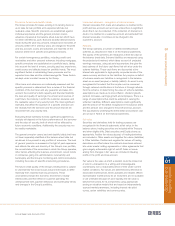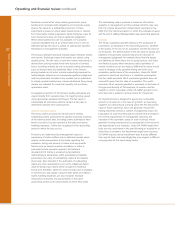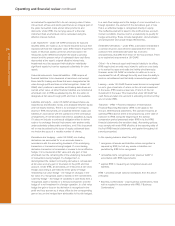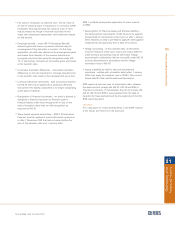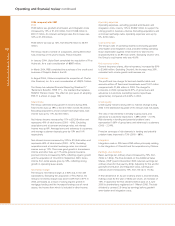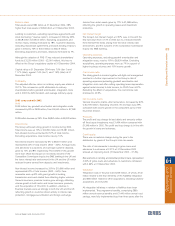RBS 2004 Annual Report Download - page 62
Download and view the complete annual report
Please find page 62 of the 2004 RBS annual report below. You can navigate through the pages in the report by either clicking on the pages listed below, or by using the keyword search tool below to find specific information within the annual report.
60
Operating and financial review
Operating and financial review continued
Risk factors
Set out below are certain risk factors which could affect the
Group’s future results and cause them to be materially different
from expected results. The Group’s results are also affected by
competition and other factors. The factors discussed in this
report should not be regarded as a complete and
comprehensive statement of all potential risks and
uncertainties.
The financial performance of the Group is affected by
borrower credit quality and general economic conditions, in
particular in the UK, US and Europe
Risks arising from changes in credit quality and the
recoverability of loans and amounts due from counterparties
are inherent in a wide range of the Group’s businesses.
Adverse changes in the credit quality of the Group’s borrowers
and counterparties or a general deterioration in UK, US,
European or global economic conditions, or arising from systemic
risks in the financial systems, could affect the recoverability
and value of the Group’s assets and require an increase in the
provision for bad and doubtful debts and other provisions.
Changes in interest rates, foreign exchange rates, equity prices
and other market factors affect the Group’s business
The most significant market risks the Group faces are interest
rate, foreign exchange and bond and equity price risks.
Changes in interest rate levels, yield curves and spreads may
affect the interest rate margin realised between lending and
borrowing costs. Changes in currency rates, particularly in the
sterling-dollar and sterling-euro exchange rates, affect the
value of assets and liabilities denominated in foreign
currencies and affect earnings reported by the Group’s non-
UK subsidiaries, mainly Citizens, RBS Greenwich Capital and
Ulster Bank, and may affect income from foreign exchange
dealing. The performance of financial markets may cause
changes in the value of the Group’s investment and trading
portfolios. The Group has implemented risk management
methods to mitigate and control these and other market risks to
which the Group is exposed. However, it is difficult to predict
with accuracy changes in economic or market conditions and
to anticipate the effects that such changes could have on the
Group’s financial performance and business operations.
The Group’s insurance businesses are subject to inherent risks
involving claims
Future claims in the Group’s general and life assurance
business may be higher than expected as a result of changing
trends in claims experience resulting from catastrophic
weather conditions, demographic developments, changes in
mortality and other causes outside the Group’s control. Such
changes would affect the profitability of current and future
insurance products and services. The Group re-insures some
of the risks it has assumed.
Operational risks are inherent in the Group’s business
The Group’s businesses are dependent on the ability to
process a very large number of transactions efficiently and
accurately. Operational losses can result from fraud, errors by
employees, failure to document transactions properly or to
obtain proper authorisation, failure to comply with regulatory
requirements and Conduct of Business rules, equipment
failures, natural disasters or the failure of external systems, for
example, the Group’s suppliers or counterparties. Although the
Group has implemented risk controls and loss mitigation
actions, and substantial resources are devoted to developing
efficient procedures and to staff training, it is only possible to
be reasonably, but not absolutely, certain that such procedures
will be effective in controlling each of the operational risks
faced by the Group.
Each of the Group’s businesses is subject to substantial
regulation and regulatory oversight. Any significant regulatory
developments could have an effect on how the Group
conducts its business and on the results of operations
The Group is subject to financial services laws, regulations,
administrative actions and policies in each location in which
the Group operates. This supervision and regulation, in
particular in the UK, if changed could materially affect the
Group’s business, the products and services offered or the
value of assets.
Future growth in the Group’s earnings and shareholder value
depends on strategic decisions regarding organic growth and
potential acquisitions
The Group devotes substantial management and planning
resources to the development of strategic plans for organic
growth and identification of possible acquisitions, supported
by substantial expenditure to generate growth in customer
business. If these strategic plans do not meet with success,
the Group’s earnings could grow more slowly or decline.
Critical accounting policies
The reported results of the Group are sensitive to the accounting
policies, assumptions and estimates that underlie the preparation
of its financial statements. The Group’s principal accounting
policies are set out on pages 139 to 142. UK company law and
accounting standards require the directors, in preparing the
Group’s financial statements, to select suitable accounting
policies, apply them consistently and make judgements and
estimates that are reasonable and prudent. Where UK GAAP
allows a choice of policy, Financial Reporting Standard (“FRS”)
18 ‘Accounting Policies’ requires an entity to adopt those
policies judged to be most appropriate to its particular
circumstances for the purpose of giving a true and fair view.
The judgements and assumptions involved in the Group’s
accounting policies that are considered by the Board to be the
most important to the portrayal of its financial condition are
discussed below. The use of estimates, assumptions or models
that differ from those adopted by the Group would affect its
reported results.


